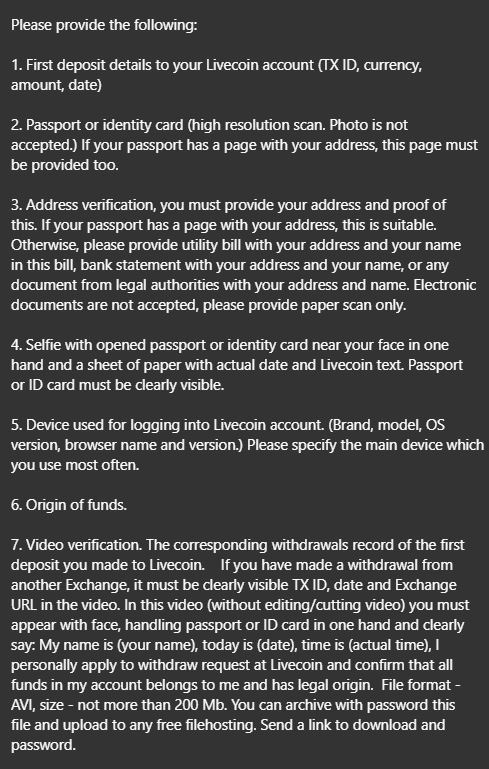Russian Crypto Exchange Shuts Down Amid Accusations of Exit Scam
Publikováno: 19.1.2021
 The Russian cryptocurrency exchange Livecoin has shut down amid accusations that it has pulled an exit scam. Customers are unable to withdraw their funds and have been asked to provide extensive identifying information which they fear would lead to identity theft. The exchange claims that it was hacked in December. Livecoin Crypto Exchange Closes Down […]
The Russian cryptocurrency exchange Livecoin has shut down amid accusations that it has pulled an exit scam. Customers are unable to withdraw their funds and have been asked to provide extensive identifying information which they fear would lead to identity theft. The exchange claims that it was hacked in December. Livecoin Crypto Exchange Closes Down […]

The Russian cryptocurrency exchange Livecoin has shut down amid accusations that it has pulled an exit scam. Customers are unable to withdraw their funds and have been asked to provide extensive identifying information which they fear would lead to identity theft. The exchange claims that it was hacked in December.
Livecoin Crypto Exchange Closes Down
The Russian cryptocurrency exchange Livecoin announced Saturday the decision to close down its platform.
The exchange claimed in December that it was hacked. As news.Bitcoin.com reported, hackers supposedly manipulated the prices of several major cryptocurrencies, including bitcoin whose price shot up to $500K on the platform. Since the incident, users have been trying to get their funds out of the exchange with no success, which has led many to believe that the platform’s operator pulled an exit scam.
The announcement, posted on the Livecoin website in English and Russian on Saturday, reads:
Our service has been damaged hard in technical and financial way. There is no way to continue operative business in these conditions, so we take a hard decision to close the business and paying the remaining funds to clients.
‘Suspect’ Requirements to Get Money Back
To receive a refund, customers have been asked to send a request with their name and registration date to an email address provided by Livecoin. Users have two months to file a claim, and March 17 will be the last date that requests will be accepted.
Once customers email the initial request, the exchange says they will receive “detailed instructions” on how to verify their claims. Livecoin stated that payments will only be sent after customers pass a “verification procedure.” While some users insist that Livecoin never replied to their emails, those who received an email back have shared the verification procedure on social media, which has seven steps for customers to complete in order to qualify for a refund.
The first is for users to provide details of their first deposit on the exchange. One user argued, “My account is from 2017, it is impossible to know my first deposit.” Many others share the dilemma, emphasizing that they can no longer log into their Livecoin accounts.
In addition, customers must provide a “high resolution scan” of their passport or identity card, proof of address, detailed information of the device used to log into the Livecoin account, as well as details of the origin of their funds. Furthermore, the exchange also asked for a “Selfie with opened passport of identity card” and a video verification.

Users Cry Exit Scam and Possibly Identity Theft
One user tweeted to Livecoin: “I got [the] email but why [are] you asking [for] too much documents like you want to open a bank account with my name. I can’t understand why you are doing this.”
Another voiced the same concern, asking Livecoin, “Why do you collect so much data for a refund?” adding that with such data anyone can take out large loans. A third opined, “they ask too much and some unnecessary info which is suspicious.” A fourth user wrote:
This information they ask for is suspect, virtually no user will be able to recover their funds with this information.
Livecoin’s customers on Twitter are angry and worried that they will not be able to get their money back from the exchange. Furthermore, adding insult to injury, Livecoin’s notice warns: “In case of abuse and threats in conversation, the claim can be declined.” One Twitter user concluded:
They exit scammed … our money is gone forever and they want our identities too, to get loans with those.
Do you think this exchange is pulling an exit scam? Let us know in the comments section below.